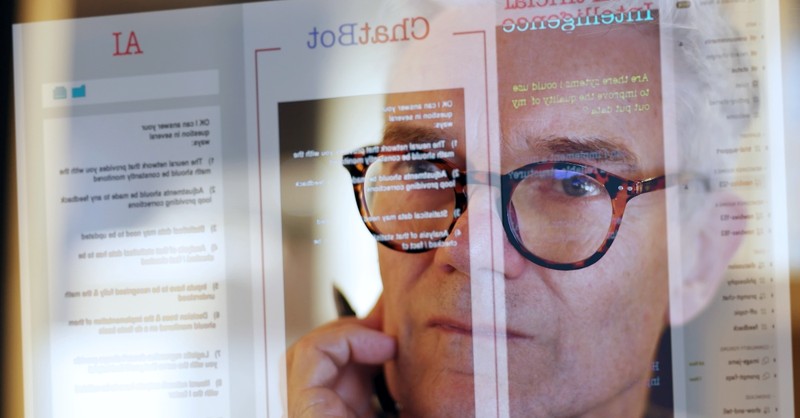
Many of us have seen the extraordinary capacities of ChatGPT. A few months ago, a couple of friends plugged in my preaching into an AI (Artificial Intelligence) piece of software, sampling my voice. Then I cut and pasted random text from the internet, and hey-presto, it was my voice – so uncannily similar that I myself could not distinguish it – saying things that I had never said. It was a fun and amusing moment. I asked them if they could get me to speak in a different language. Off we went to Google Translate, translated a text into German, and had me speak in perfect German. To test the model, one of them tried my German speaking on a friend of theirs who is a native-born German. His verdict? Josh speaks perfect German but with a British accent! So the AI had not only got me to speak perfect German but had kept enough of my intonations to indicate my British accent origins.
What are the implications of all this for the gospel? I’m not sure I have the answer to that, but here are some principles to bear in mind as we think it through together.
Photo Credit: ©Aaron Burden/Unsplash, Getty Images/Yuichiro Chino/SWN Design

1. Not Everything About It Is Bad
Certainly, you can (and you should not) use this technology to cheat on term papers, write emails as if you were personally writing them, and more. On the other hand, you can use it to provide some filler text for some anonymous information, and there doesn’t seem to be anything wrong with that – it feels to me like using a rather sophisticated dictionary. That said, there are many “tells” that go with ChapGPT writing. They tend to be or feel “plastic-y.” It’s hard to define it, but I think I can spot it. Perhaps soon, I won’t be able to. At any rate, it doesn’t feel necessarily all bad.
Photo Credit: ©iStock/Getty Images Plus/Supatman

2. Not Everything About It Is Good
On the other hand, the pitfalls are legion. To begin with, it can easily induce laziness. It might seem easier to have a machine write your emails for you or summarize some book that you half-read. But shortcuts usually end in long delays. And if you don’t put in the work to understand something yourself, and writing is at least halfway essential to understanding, then, well, you won’t understand. And that’s a problem. If TV, then the Internet, then Smart Phones, can make Dumb People, how much more can ChatGPT, and its various AI cousins, make us become only superficially intelligent ourselves? As someone who has taught undergraduate students at a college level, I am sometimes astonished by the lack of ability to write a coherent sentence, let alone a paragraph. What AI will do to an already semi-literate if the usage is not carefully proscribed doesn’t bear thinking about. We think in words. We think as we write. AI could cut out that for some, and that will have untold consequences.
Photo Credit: ©iStock/Getty Images Plus/Laurence Dutton

3. Find A Path Between Being a Luddite and Eugenics
Whenever there is a new technology on the horizon, those who approach it with caution are called “luddites” after a movement that resisted various parts of the industrial revolution. We don’t want to be luddites. On the other hand, it is without question that not all technologies are uniform goods in the wrong hands. The most egregious, evil example of this lies with the Nazi so-called “scientists” use of experimentation on prisoners under the guise of finding cures and military advances for the eugenic priorities of the master race. Nor, should we say, is it wrong-head to seek a middle ground as if that were some of nefarious compromise in itself. Long ago, Aristotle advised “the golden mean.” We often find a path to wisdom by avoiding extremes, approaching new matters with Biblical fear-of-God passion, and taking the right next step and doing the right next thing.
Photo Credit: ©iStock/Getty Images Plus/Poca Wander Stock

4. Naivete About Future Comfort Is Unwise
While we don’t want to think as if we are living within a dystopian science fiction 1984 movie, nor is it wise to pretend that everything will come up roses and there’s never any need for decisive action. There are biotechnologies that we have under lock and key that should stay there. There may well be aspects of this technology that need to be carefully ruled out of common practice. Look at the ongoing impact of social media: much interaction of good if somewhat meaningless kinds, and yet also the very real danger of cyberbullying. Could social media have been made better if action were taken earlier to limit the well-known addictive properties of “doom scrolling,” for instance?
Photo Credit: ©GettyImages/sticker2you

5. A Christian Has Ultimate Future Confidence
Was it Billy Graham who said I’ve read the last sentence in the Bible, and it all turns out well? Christians need today to return to a great positive confidence in God’s sovereign control not only of the present but of the future too. We need to have no fear of AI if we live in fear of him. “God will wipe away every tear from their eyes” (Revelation 7:17).
RELATED PODCAST:
Photo Credit: ©GettyImages/Wavebreakmedia

Originally published Thursday, 07 March 2024.








